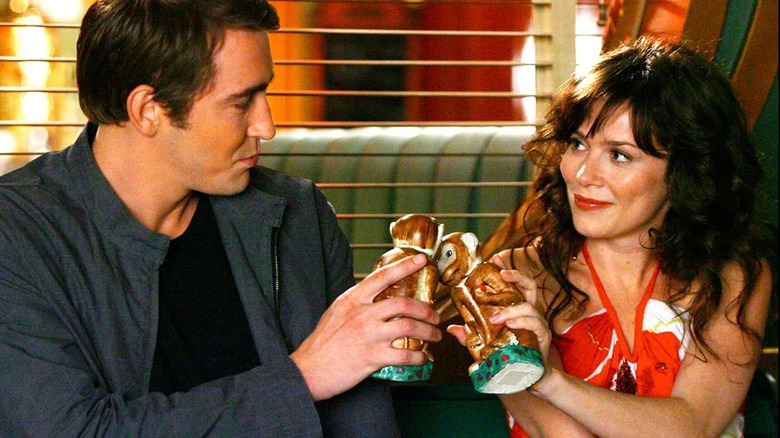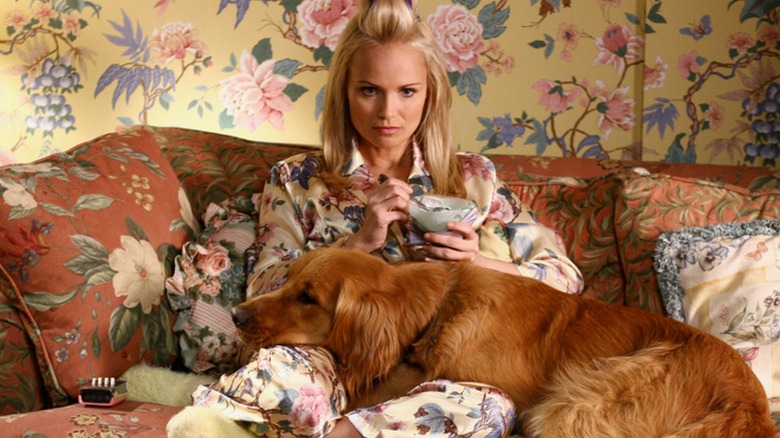Before Foundation, Lee Pace Starred In An Overlooked TV Series With 96% On Rotten Tomatoes
This post contains major spoilers for "Pushing Daisies."
Apple TV+'s "Foundation" has become something of a sleeper hit. There's a lot to love in the course of the three seasons that have aired so far, but Lee Pace's Cleon is an intriguing focal point. Immortal and navel-less for lore-related reasons, this version of Cleon (dubbed Brother Day) is narcissistic and petulant, plagued by insecurities that are hidden beneath layers of glib humor and menace. This might be one of Pace's most nuanced performances to date, as the actor makes this antagonist feel so larger-than-life that the merits of "Foundation" wouldn't function the same without him. Pace's magnetic presence aside, the ongoing "Foundation" is the hottest new entry in sci-fi television. It is a show that reinterprets the concepts of artificial intelligence and genetic cloning through the lens of an epic, and the results speak for themselves.
Pace's career highlights are truly commendable — the man has played Thranduil in "The Hobbit" trilogy, Ronan the Accuser in the MCU, and delivered an astounding early-career performance in Tarsem Singh's "The Fall." But we don't talk enough about Bryan Fuller's "Pushing Daisies," the comedy-drama series that earned Pace an Emmy nomination for Outstanding Lead Actor in a Comedy Series. The show didn't fit into genre boxes from the word go, which is expected if you're acquainted with Fuller's creative approach to, well, anything (as best evidenced in his "Hannibal," which has set a very high bar for the psychologically dense crime procedural formula).
"Pushing Daisies" uses a fairy tale combined with a veiled forensic procedural format to ground the most eccentric situations and characters, which helps create a storyline that is sincerely sweet and profoundly morbid at once. But what makes this acclaimed series so special?
Pushing Daisies is like a strange, beautiful storybook come to life
The show's premiere, "Pie-lette," introduces Ned (Pace), the charming proprietor/chef of a bakery with an unsettling secret. Ned can bring things back from the dead with just one touch, but he cannot abuse this power willy-nilly. If Ned brings back an entity for more than a minute, then another entity of equal mass must die in its place. This alone is an insane premise, as it almost feels like a one-off episode of "Buffy the Vampire Slayer" or "Supernatural," but Fuller's show veers into warmth and comedy instead.
The visual aesthetic of "Pushing Daisies" is like that of a pop-up storybook: bold, vibrant, and full of colorful characters who are eccentric in a way that complements the surreal quasi-reality of the show. There's also a quirkiness to the setting, which clashes (pleasantly) with the more philosophical themes embedded in Ned's isolation. Not being able to hold anyone he loves, Ned can only use his gift on corpses for a minute to help solve their murders or convey their final wishes. This is when Chuck enters the scene.
After Ned resurrects his murdered childhood crush, Chuck (Anna Friel), they fall in love. Law of equivalent exchange aside, a second touch by Ned can send the resurrected entity back to the land of the dead, which is permanent. Thus, the couple is only able to touch through indirect means — they lovingly kiss through a cling wrap and wear gloves while holding hands. However, as expected, trouble brews over the horizon soon enough.
It is a shame that "Pushing Daisies" ended only after two seasons (partially due to the 2008 Writers' Strike), but there's reason to be grateful for a story that wasn't afraid to take such weird, wonderful swings.

